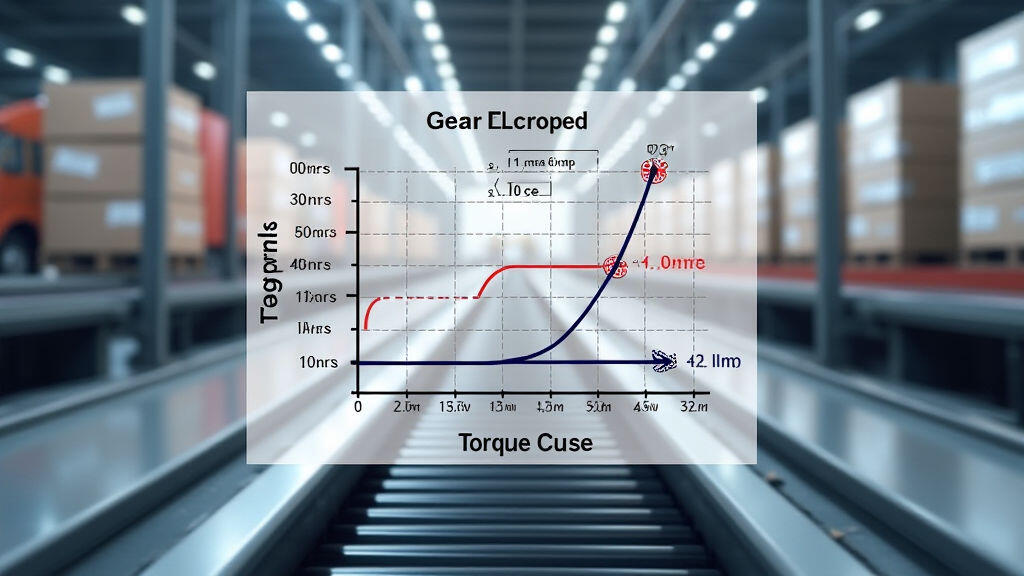
In today's rapidly evolving logistics and conveying industries, efficiency, reliability, and cost-effectiveness are paramount. The heart of many material handling systems – conveyor belts, automated guided vehicles (AGVs), sorting machines, and robotic arms – lies in the gear motors that power them. Choosing the right gear motor manufacturer is therefore a critical decision, significantly impacting operational performance and overall business success. This article outlines the key parameters that logistics and conveying enterprises should carefully consider when selecting a gear motor manufacturer, going beyond basic specifications to encompass factors relevant to current industry trends and futureproofing.
The logistics sector is experiencing unprecedented growth, fueled by e-commerce expansion, increasing global trade, and the ongoing trend towards automation. This surge in demand is placing immense pressure on material handling systems. Unreliable gear motors can lead to costly downtime, production delays, and ultimately, lost revenue. Furthermore, sustainability is increasingly important. The push for greener operations necessitates energy-efficient gear motors that minimize environmental impact. These demands create a complex landscape for enterprises navigating the selection process.
While business considerations are vital, a solid foundation of technical specifications is non-negotiable. Here are some core technical parameters to evaluate:
Gear Ratio and Torque: This is fundamental. The gear ratio dictates the relationship between input and output speed and torque. Logistics applications often require specific torque profiles to handle varying load conditions. Evaluate the manufacturer’s ability to provide gear motors with customized ratios to meet precise system requirements. Look for datasheets that clearly illustrate torque curves under different operating conditions. [  ]
]
Speed and Efficiency: Gear motor efficiency is directly linked to energy consumption and operating costs. Higher efficiency translates into lower electricity bills and a smaller carbon footprint. Pay close attention to the efficiency ratings (typically expressed as a percentage) at various load levels. Manufacturers should provide detailed energy consumption data for different operating scenarios. Current industry focus on minimizing energy waste makes this a crucial consideration.
Gearbox Type and Materials: Different gearbox types (e.g., helical, bevel, planetary) offer varying levels of efficiency, noise reduction, and load capacity. The materials used in the gearbox (e.g., steel, aluminum) also influence durability and performance. Choose a gearbox type and materials suited to the specific application environment and load characteristics. For harsh environments, consider specialized coatings and materials.
Motor Type and Power Rating: The motor type (e.g., AC induction, brushless DC) should be selected based on power requirements, speed control needs, and operating environment. The power rating must be adequate to handle the peak loads without overheating or damaging the motor. Consider the manufacturer's expertise in different motor technologies.
Protection Level (IP Rating): Logistics environments can be dusty, humid, and subject to occasional spills. Ensure the gear motor has an appropriate IP (Ingress Protection) rating to protect against dust and water ingress. Higher IP ratings signify greater protection and longer lifespan, ultimately reducing maintenance costs.
In addition to the core technical parameters, consider these emerging trends and critical factors for long-term success:
Customization Capabilities: The ability to customize gear motors to meet specific application requirements is increasingly important. This includes tailoring gearbox ratios, motor power, and even physical dimensions. A manufacturer with strong design and engineering capabilities is invaluable. MES-Drive, for example, offers extensive customization options, allowing clients to specify motor characteristics down to the millimeter.
Quality Control and Testing: A robust quality control system is essential to ensure consistent performance and reliability. Inquire about the manufacturer's quality control procedures, testing protocols, and certifications (e.g., ISO 9001). Look for manufacturers that conduct rigorous testing under simulated operating conditions.
Supply Chain Reliability: Global supply chain disruptions have highlighted the importance of reliable sourcing. Evaluate the manufacturer’s supply chain management practices, including raw material sourcing, component procurement, and logistics capabilities. A stable and resilient supply chain is crucial for uninterrupted operations.
Service and Support: Access to prompt and reliable service and support is vital for minimizing downtime and maximizing the lifespan of gear motors. Consider the manufacturer’s availability of technical support, spare parts, and warranty terms. Does the manufacturer offer preventative maintenance programs?
Digitalization & IoT Integration: The Industrial Internet of Things (IIoT) is rapidly transforming the logistics sector. Consider gear motors with integrated sensors and connectivity features that enable remote monitoring, predictive maintenance, and performance optimization. MES-Drive’s smart gear motors, for instance, can transmit data on temperature, vibration, and power consumption, allowing for proactive maintenance interventions. [  ]
]
Sustainability Initiatives: Increasingly, logistics companies are prioritizing sustainability. Choose a manufacturer committed to environmentally responsible practices, including energy-efficient designs, waste reduction, and responsible sourcing of materials.
The future of gear motors in logistics lies in enhanced intelligence, increased efficiency, and seamless integration with smart systems. As automation continues to expand, demand for high-performance, reliable, and energy-efficient gear motors will only increase. Manufacturers who embrace digitalization, prioritize sustainability, and offer customization capabilities will be best positioned to thrive in this evolving market.
Selecting the right gear motor manufacturer is a strategic decision that directly impacts the performance, reliability, and cost-effectiveness of logistics and conveying systems. By carefully evaluating technical specifications, emerging trends, and supplier capabilities, enterprises can ensure they choose a partner that can meet their current needs and support their future growth. The integration of IoT and the increasing demand for sustainable solutions are shaping the future of gear motors; therefore, selecting a forward-thinking manufacturer like MES-Drive, which is actively innovating in these areas, is crucial for navigating the complexities of the modern logistics landscape and remaining competitive in an increasingly demanding marketplace. The ability to monitor and optimize gear motor performance in real-time will be a key differentiator for logistics companies in the years to come.
Leave A Reply
Your email address will not be published. Required fiels are marked